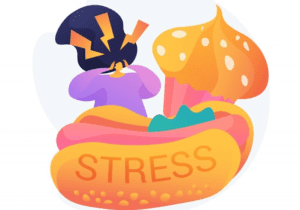When Anger Visits: A Parent’s Guide to Calming Big Emotions
This article has been researched and written by Hacer Subasi. AI has not been used in producing this article.
Anger is a natural and necessary emotion—but for children, it can feel overwhelming and hard to express. This short guide is written for you, dear parents, with simple language and playful strategies you can read with your child or to your child. The goal is to help them recognise their emotions, feel understood, and discover safe and creative ways to express what’s going on inside.
Did you know? Sometimes, out of nowhere, a big feeling might come and knock on the door of your heart. One of those big feelings could be anger. And guess what? That is okay. If there are people around you who ignore you, move away from you, or even punish you when you are angry, maybe you can gently let them know that ‘anger is a natural emotion’. It is something all of us feel sometimes.
The first thing to remember is: It is totally okay to feel angry. There’s nothing wrong with it—it is just your heart’s way of saying something important.
The second thing is this: When anger knocks on your heart’s door, you can be kind and invite it in. That is very caring and welcoming thing to do. Otherwise, you might feel so mad your face gets hot, your fists clench, or your tummy feels funny. But what matters is what you do with that anger. Here are some fun and helpful ways to calm down when you feel like a volcano ready to erupt!
1. Cookie Breathing (Inspired by Liana Lowenstein)
Imagine you’re holding your favourite warm, yummy cookie. First, take a deep breath in to smell the cookie (sniff in through your nose)… now blow on it to cool it down (slowly blow out through your mouth). Try it three times. Doesn’t that feel nice?
2. Draw It Out
Grab your crayons or markers and draw what your anger feels like. Maybe it’s a red tornado or a spiky ball! Putting your feelings on paper helps them come out safely.
3. Chill-Out Spot
Create your own “calm-down corner” with soft pillows, toys, or a fidget toy. When you’re angry, you can go there to feel safe and cool off.
4. Use Your Words
Try saying, “I feel angry because…” or “I don’t like when…” Talking about your feelings helps grownups understand you better.
5. Try a Feelings Thermometer
Think of your feelings like a thermometer. Are you just a little warm (a bit annoyed)? Or boiling hot (super angry)? Noticing your feelings helps you stop before you explode!
6. Be Like a Turtle
When you feel super mad, pull back like a turtle! Close your eyes, take a deep breath, and wait before you act. Then, come out slowly when you feel calmer.
7. Ask for a Hug
Sometimes, just a hug from someone who loves you can make the angry feeling melt away—like ice cream in the sun.
Whether you’re looking for a bedtime conversation starter or a tool during tough moments, these gentle tips will guide you
and your little one toward calmer, more connected experiences.
Stress vs. Anxiety vs. Burnout: How to Recognize the Difference
In today’s fast-paced world, understanding the differences between stress, anxiety, and burnout is crucial for …
Relocation Depression: Definition and Ways to Cope
Relocation depression, also known as moving depression, is a form of situational depression that arises from the stress …
How to Help Your Child with Anxiety Through Divorce
Divorce is a significant change that affects every member of a family. For children, the uncertainty and adjustments …
Depression vs Sadness: Understanding the Difference
While often used interchangeably, the terms “sadness” and “depression” represent distinct emotional states, each with …
5 Simple Mental Health Practices for Your Everyday Life: Nurturing Your Body & Mind
In today’s fast-paced world, it’s becoming increasingly evident that we need to place our mental health at the forefront
Ways to Reduce Anxiety in 2024
As we say farewell to 2022 and usher in the New Year, we look towards the future. With New Year’s resolutions on the docket, many of us are striving to achieve a calm life …
Navigating Compassion Fatigue in the Digital Age: A Call to Prioritize Mental Well-Being
Amid the constant stream of information and images that flood our screens, the toll on our mental well-being can be …
The Link Between Anxiety and Overeating
All of us have encountered moments of stress and unease throughout our lives. These feelings of anxiety not only bring…
10 Steps To Fix A Toxic Relationship
Every relationship has its fair share of ups and downs, but when toxicity creeps in, it can become a serious challenge. Toxic relationships can be emotionally draining and detrimental to our overall …
Exploring the Benefits of EMDR Therapy for Anxiety and Depression
Anxiety and depression are two of the most common mental health disorders worldwide, affecting millions of people every year. While traditional talk therapy and medication can be …











